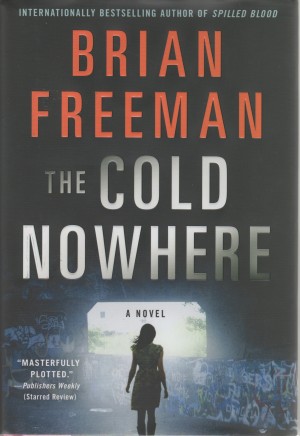
The Cold Nowhere by Brian Freeman (2013. Quercus. ISBN 9781623651312)
My friend Ron McVean, an avid reader and sometime pre-reader of my manuscripts, handed me his autographed copy of this Freeman thriller with the admonition, “I read it but didn’t get excited by it. Maybe you’ll like it.” Faint praise, eh? So with that lukewarm endorsement, I carried Ron’s hardcover version of the book with me on a recent fishing trip to Ontario. I had my own demons, my own biases to exorcise before I could give Freeman’s book a fair shake as a reviewer. To be frank, I’m not sure I was able to accomplish that task so I’ll disclose the worst of my prejudices here and you can, if you so choose, simply ignore this review.
Envy. Jealousy. Local boy reading a story written about his hometown by a stranger. They all add up to this: While I understand why authors who have no lasting connection with Duluth and the Arrowhead Region of Minnesota (Freeman, Krueger, and Sundstol) might want to choose Duluth or the Iron Range or the North Shore as a setting for a novel (it is, after all, God’s country!), I continue to be unimpressed by the depictions of my backyard by folks who are just passing through, taking notes, and penning novels based upon casual observations about where I live, where I grew up. That these same authors, strangers to the land I inhabit, receive accolades for genre fiction full of cutesy landscapes that bear only a superficial likeness to the Northland irks me. There. The disclosures have been made. Take them for what they’re worth. Read on or move on, your choice.
That having been said, I wanted to desperately like this book. I wanted to be compelled by Cat, the young prostitute’s back story of deprivation and neglect, by the investigator and chief protagonist’s, Jonathan Stride’s, inner struggles and past, and by the romantic possibilities of the juxtaposition of Stride with two former lovers (also cops) in the investigation of a string of suspicious deaths. But I couldn’t, as my friend Ron suggested, get past the implausibility of the plot, the confusion of some of the action sequences, or the lack of a main character, any character, that I could relate to or cherish. It’s not that the writing isn’t professional: it is certainly that. It isn’t that the dialogue is clunky or overwrought: Freeman can write a scene that seems credible as characters engage with each other. And it’s not that he got geographic landmarks wrong (i.e., Enger Tower doesn’t mysteriously migrate to Canal Park). It is, in my humble view, that after 420 pages of reading, I really didn’t care what happened to Cat or Jonathan or Maggie or Ken.
In addition, the various suspects in the story read like a list of stereotypes: Greedy used car salesman, devious cop, the older sister with a drug problem and a traumatic past. Additionally, there isn’t, in my view, much excitement or suspense, or suspension of disbelief at work in the arc of the story or in the character’s actions throughout the book. The book isn’t badly written; there are no major impossibilities that muck up the plot. There just wasn’t enough here to hold my interest, to compel me to stay up late into the night by the light of my headlamp at Elsie Lake Fishing Camp to finish the story.
Bookstore owners have repeatedly asked me, “Have you read Brian Freeman?” I used to answer, “No.” Now I can respond, “Yes.” And that’s about all I will say.
3 stars out of 5.


